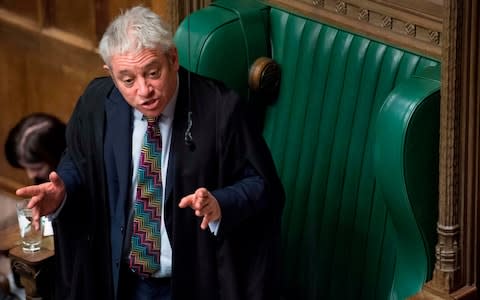Brexit vote: what time is it tonight and what does the rebel bill to extend Article 50 mean?

Boris Johnson's Government tonight faces the first challenge in Parliament to its Brexit strategy.
A group of opposition and rebel MPs have published a bill to extend Article 50 and stop the UK from leaving the EU without a deal.
Because the group is led by the Opposition - not the Government - they must rely on the obscure parliamentary rule Standing Order 24 (SO24) to allow them to debate a bill in the Commons.
Tonight, MPs will debate and vote on whether the bill should be heard on Wednesday - what has been called 'taking control of the order paper'.
If the motion to allow the debate on the rebel bill passes on Tuesday night, Boris Johnson will be one step closer to calling a General Election, which his is expected to do if the legislation passes.
What are the timings for tonight?
5.30pm - Ministers will give statements on preparations for Brexit and education funding.
After 6pm - Sir Oliver Letwin is expected to apply for an emergency debate under SO24 on whether to debate the rebel bill.
Until 10pm If Sir Oliver's application to the Speaker is successful, the debate will take place.
No later than 10pm - MPs vote.
By 10.30pm - The result of the vote will be announced.
What is the rebel bill?
The proposed legislation - The European Union (Withdrawal) (No. 6) Bill 2019 - has several elements designed to restrain the Government and force it to be accountable to Parliament for the rest of the Brexit process.
Downing Street is expected to make the bill a confidence issue, and has told Conservative MPs that they must vote with the Government or face being deselected at the next election - which may be very soon.
Boris Johnson said the bill intends to "chop the legs out from under the Government".
"There are no circumstances in which I would ask the European Union to delay," he said.
If MPs vote for the legislation, the UK could see a General Election on October 14, the BBC reported.
Election expected Oct 14th IF rebel MPs defeat govt
— Laura Kuenssberg (@bbclaurak) September 2, 2019
Who is supporting the bill?
We won't know for sure who supports the new bill until the vote takes place, which opposition and rebel MPs hope will be this week.

Hilary Benn, Chair of the Exiting the European Union Select Committee, will propose the bill as a private member's bill, supported by:
Alastair Burt, Conservative
Philip Hammond, Conservative
David Gauke, Conservative
Tom Brake, Liberal Democrat
Stephen Gethins, SNP
Jonathan Edwards, Plaid Cymru
Joan Ryan, Change UK
Caroline Lucas, Green
Chris Bryant, Labour
Stephen Doughty, Labour
Nick Boles, Independent
The Labour Party, which has consistently argued against no deal and for the extension of Article 50, can be expected to support it, as can the Green Party and SNP.
A number of Tory rebels are expected to defy the Tory whips and vote against the Government anyway, putting their careers at risk.
When will MPs vote on it?
MPs will attempt to take control of Parliamentary business for one day in order to hold an emergency debate.
On Tuesday, MPs are expected to use Standing Order 24 - or SO24 - to vote on whether to debate the rebel bill.
The debate would then be scheduled, probably for Wednesday.

MPs will require some help from the Speaker to see their bill on the floor of the House. It will be up to John Bercow to decide whether MPs can vote on whether the debate will take place.
What does the bill say?
The main point of the rebel bill is to force the Government to ask the EU for an extension to Article 50, delaying Brexit until January 31.
It calls for the Prime Minister to "obtain from the European Council and extension of the period under Article 50(3) of the Treaty of the European Union ending at 11pm on 31 October 2019 by sending to the President of the European Council a letter...requesting an extension of that period to 11pm on 31 January 2020".
1/8 The European Union (Withdrawal) (No. 6) Bill 2019 pic.twitter.com/16cmhdRkOp
— Hilary Benn (@hilarybennmp) September 2, 2019
The three-month extension is designed to give the Government more time to negotiate a deal with the EU, involving a possible re-opening of the Withdrawal Agreement negotiated by Theresa May and an attempt to solve the controversial issue of the Northern Ireland backstop.
What if the EU does not agree to an extension?
If the EU agrees to an extension, the bill mandates the Prime Minister to accept it.
If the EU proposes an alternative extension, the bill says Parliament must agree to it within a time frame of two days, after which the Prime Minister must accept.

What happens to the negotiations in the meantime?
While the Government is negotiating during the proposed extension to Article 50, the bill requires the Prime Minister to publish reports for Parliament, updating MPs on the latest developments.
The first of these reports would be made on November 30, and Parliament would be required to approve it within five days.

If Parliament rejects the bill, the Government would have to publish another report by January 10, three weeks before the proposed new Brexit deadline.
The bill then requires the Government to publish a new report every 28 days, updating MPs on the negotiations. This last clause makes provision for a further extension to Article 50 beyond January 2020.

 Yahoo News
Yahoo News 
